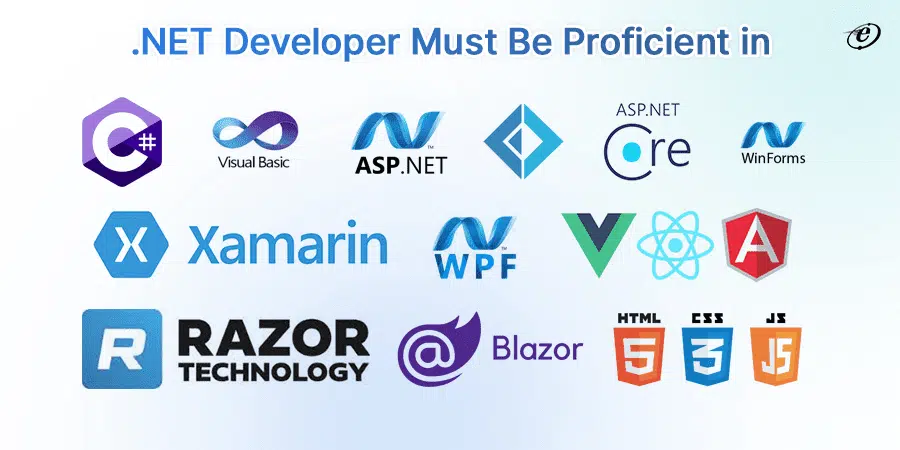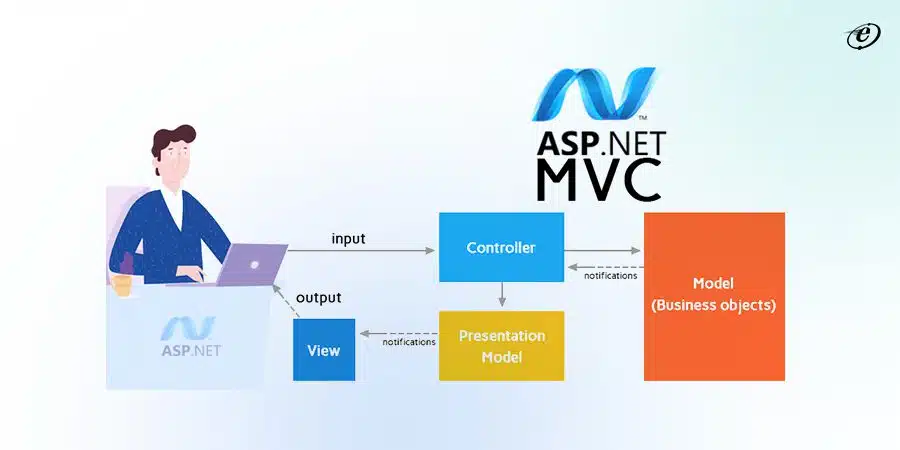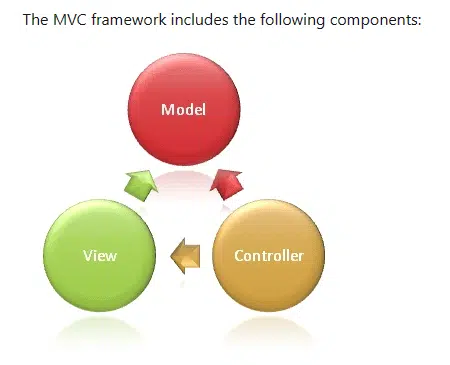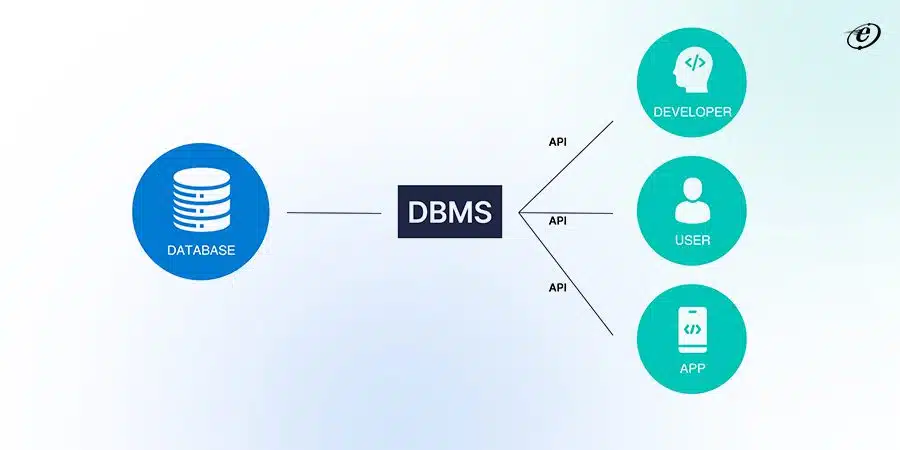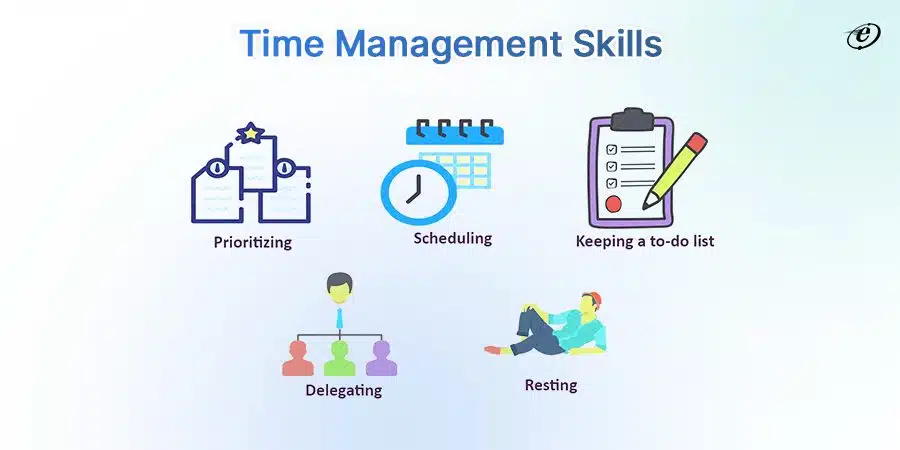“Making good decisions is a crucial skill at every level “
You can relate to this thought while hiring developers or a development team for your next 01project. Your project, in the right hands, will surely aid your business’s growth!
In the realm of software development, scalable, potent, and enterprise-grade apps benefit significantly from the .NET framework. NET developers hold a distinct place in building flexible and high-performance applications for the web, servers, and several platforms.
.NET has grown in popularity recently (16.57% of developers globally use it) because it allows programmers to develop apps that can run on various platforms.
Asp.NET is 5th most popular Framework in India.
While going to outsource .NET development, make sure to choose a technically competent and knowledgeable.NET developer to get the desired.NET development services.
.NET offers a stable and scalable programming architecture that gives developers the tools to produce dependable and high-performance enterprise applications. However, an expert and knowledgeable developer following best practices for .NET optimization may create a solid and user-friendly digital solution for your business.
A .NET developer oversees planning, customizing, and developing software applications in accordance with the requirements of a business. His duties include support, ongoing development, and identifying and evaluating software prerequisites.
In addition to their technical expertise, .NET engineers need to be able to collaborate well with others and have excellent communication and problem-solving abilities.
40.
This blog post will highlight all the .NET developer skills required for every project. Let’s start with the basics and revise everything to better connect with this write-up.
Overview of .NET
Microsoft created the free and open-source software development framework-.NET. It offers a platform that enables dedicated developers to develop applications using various programming languages, including C#, F#, and Visual Basic. This platform also contains a set of libraries, a runtime environment, and development tools.
With .NET, you can create digital solutions for the web, mobile, desktop, gaming, IoT, and more using a variety of languages, libraries, and editors. This framework is intended to streamline the software development process by offering a standard programming paradigm and a set of APIs that can be utilized across many operating systems and devices
.NET is used in various industries and scenarios:
- Web Development: ASP.NET enables the building of dynamic websites and web applications.
- Desktop Apps: WinForms and WPF create Windows-based software.
- Mobile Apps: Xamarin facilitates cross-platform mobile app development.
- Cloud Services: .NET can power cloud-based applications on platforms like Azure.
- Game Development: Unity3D uses .NET for game development.
- IoT: .NET can be applied to Internet of Things (IoT) projects.
- Data Analytics: It supports data processing with libraries like ML.NET.
- Enterprise Software: .NET is prevalent in enterprise-level applications and services.
Want to ramp-up your .NET development process? Then, choose our vetted experts today!
Who are .NET developers?
.NET developers are software professionals skilled in using Microsoft .NET framework for application development. They write code in languages like C#, F#, or Visual Basic to create various applications. They are proficient in database integration using Entity Framework, implement security measures, and often work on cloud-based solutions with Azure.
Hiring dedicated .NET developers offers businesses specialized expertise, cost-efficiency, and flexibility. These professionals bring in-depth knowledge of the .NET framework, ensuring efficient and high-quality development. Outsourcing NET development reduces overhead costs associated with full-time employees, such as salaries and benefits. Additionally, you can easily scale your development team up or down as project requirements change.
Let’s explore the roles & responsibilities of a .NET developer.
Essential Roles & Responsibilities of .NET Developers
- Utilizing the.NET environment and platform, design, develop, and maintain applications.
- Developing and setting up backend systems to support locally created app features and functionality.
- Ensuring that the services are scalable and work in a distributed HA system
- Developing the necessary technological environments with the client’s development and DevOps teams to implement the new architecture
- Improve the productivity and performance of the current codes and applications.
- Conduct test runs for your code to ensure top-notch results.
- Be on alert for coding problems and set up a fix.
- Verify that the application’s development complies with user requirements and needs.
- Utilize the most recent updates to the dot net frameworks and the newest technology.
- Rewriting or altering old code to improve performance and efficiency
- Sync data storage platforms while maintaining code quality
- Implement the most effective security, quality, and development approaches.
Let’s cover the required .NET Developer skills to skyrocket any project.
Why Hire .NET Developers?
Whether you’re building web and mobile applications or any other software, .NET developers can help you create a high-quality, scalable, secure solution that aligns with your business goals. Here are some compelling reasons to consider hiring .NET developers or outsourcing NET development.
-
Versatility
.NET is a versatile framework that supports a wide range of application types. This versatility means that using the same technology stack across different platforms reduces development time and costs.
-
Scalability
.NET provides scalability features that allow your applications to grow as your business does. Whether you need to handle increased user loads, expand to new markets, or add new features,.NET can support your application’s growth.
-
Security
Security is a top priority for businesses in today’s digital landscape. .NET offers robust security features, including authentication, authorization, and data protection, helping you build secure applications and protect sensitive customer data.
-
Productivity
.NET developers benefit from a mature and feature-rich ecosystem, including development tools like Visual Studio and a vast library of pre-built components. This enables developers to be more productive and deliver projects faster, saving time and money.
Explore the top .NET development tools to consider in 2023.
-
Cross-Platform Development
With .NET Core (now known as .NET 5+ and .NET 6+), you can build cross-platform mobile applications that run on Linux, Windows, and macOS. This broadens your target audience and market reach.
-
Community and Support
.NET has a vast and active developer community. It’s simple to locate knowledgeable developers and have access to a multitude of information and tools, such as forums, tutorials, and documentation. Microsoft also provides extensive support for .NET.
-
Integration
.NET seamlessly integrates with other Microsoft technologies, such as Azure, SQL Server, and Active Directory. This simplifies integration with existing systems and services.
-
Future-Proofing
Microsoft is committed to the long-term support and development of .NET, ensuring your applications remain up-to-date and compatible with emerging technologies.
Speaking of desirable traits of .NET developers, find out know-how of .NET 8. Read our blog now.
Indispensable .NET Developer Skills for Your Project
| Technical Skills | Non-Technical (Soft)Skills |
| Programming Languages & Frameworks | Problem-Solving |
| Understand Asp.NET MVC Architecture | Verbal Communication |
| Microsoft Azure | Time Management |
| Ability to Refactor Code | Collaboration |
| Proficient to work in SCRUM | Critical Thinking |
| MCSD, MCTS, and MVP Certification | Client Focus |
| Database Configuration | – |
| Expertise in Testing & Debugging | – |
The .NET developer you work with must have conceptual comprehension, an organizational understanding of its implications, and further commercial knowledge of the .NET developer’s activities.
We have covered a comprehensive list of .NET developer skills and knowledge areas from which .NET developers can benefit in various development scenarios. A solid foundation in these areas can make a .NET developer highly effective and adaptable.
Here are some of the most in-demand skills of .NET developers.
Technical Skills of .NET Developers
1. Programming Languages & Frameworks
A .NET developer should be aware of several programming languages and frameworks to be versatile and effective in various development scenarios. The .NET developer’s skills to work with these languages and frameworks empower them to tackle a wide range of projects, from web and desktop applications to mobile apps and more. Adaptability and a diverse skill set are key in the ever-evolving software development landscape.
Here’s a concise overview
| Programming Languages & Frameworks | .NET Developer Skills |
 |
As the primary language for .NET development, deep proficiency in C# is essential. It’s used for building web applications, desktop software, mobile apps, and more. |
 |
Familiarity with F# is valuable, especially for functional programming and data-intensive applications. |
 |
.NET (VB.NET): Knowledge of VB.NET can be beneficial when dealing with legacy systems or maintaining older codebases. |
 |
Mastery of ASP.NET for web development, including both ASP.NET Web Forms and ASP.NET MVC. |
 |
Proficiency in ASP.NETCore, the modern and cross-platform framework for web applications and APIs. |
| Understanding of Xamarin for cross-platform mobile app development using C# and . NET. | |
 |
.NET developer skills in creating Windows desktop applications using WinForms or WPF (Windows Presentation Foundation). |
 |
Familiarity with popular JavaScript frameworks like Angular, React, or Vue.js for building dynamic web applications. |
 |
Proficiency in Razor Pages for lightweight web pages and Blazor for building interactive web UIs using C# and .NET. |
 |
Awareness of web technologies like HTML, CSS, and JavaScript is crucial for frontend development and interactions in web applications. |
2. Understand Asp.NET MVC Architecture
.NET developers should be aware of the ASP.NET MVC architecture. It is one of the essential .NET developer skills because it’s fundamental for building web applications. Understanding MVC (Model-View-Controller) promotes clean code, separation of concerns, and test-driven development. It enhances scalability, flexibility, and modularity, making applications easier to maintain and update.
ASP.NET MVC is a crucial foundation for web development, enabling developers to create robust, maintainable, and adaptable web applications.
Let’s understand this architecture.
The .NET Framework MVC (Model-View-Controller) architecture is a design pattern used for building web applications. It’s a way to organize code and separate concerns to create maintainable and scalable web applications. The MVC architecture consists of three main components: Model, View, and Controller. Here’s an explanation for each element:
| Model | This component represents the data and business logic of the application. It is responsible for managing the data, the database interactions, and the application’s core functionality. |
| View | The View is responsible for displaying the data to the user. It represents the user interface (UI) of the application and presents the information from the Model in a user-friendly format |
| Controller | The Controller acts as a bridge between the Model and the View. It handles user requests, processes input, and invokes the appropriate Model methods to perform business logic. |
3. Microsoft Azure
Since web application development has advanced, the majority of firms want to set up a cloud-based backend for.NET apps. It helps businesses save on additional server configuration and maintenance expenses.
Microsoft’s cloud platform, known as Azure, is available for .NET applications for improved interoperability. Microsoft Azure is one of the vital .NET developer skills due to its seamless integration with the .NET framework and growing prominence in the cloud computing landscape.
Microsoft Azure complements the .NET ecosystem, offering a powerful cloud platform that empowers .NET developers to create modern, scalable, and high-performing applications. Proficiency in Azure is increasingly essential for .NET developers to stay competitive and relevant in the ever-evolving tech industry.
Azure offers several compelling reasons for .NET developers to acquire expertise in it:
- It provides a robust platform for hosting .NET applications, enabling developers to build, deploy, and scale .NET apps quickly.
- It offers a comprehensive suite of DevOps tools, facilitating continuous integration and deployment (CI/CD) for .NET projects.
- Azure’s global infrastructure ensures high availability, scalability, and exceptional performance for .NET applications, which are crucial for delivering responsive and reliable services.
- It seamlessly integrates with various Microsoft technologies, such as SQL Server, Active Directory, and Azure Functions, enhancing the development experience and making it easier to build complex enterprise applications.
4. Ability to Refactor Code
Refactoring a piece of code involves reorganizing it inside while leaving its exterior functionality and behavior untouched. .NET developers should possess robust code refactoring skills because it enhances code quality, maintainability, and efficiency.
Every time refactoring is performed, the entire scope of the code selection is examined before the code is applied to the whole section. This also applies to cross-language code, which modifies code in the most intelligent way possible using this knowledge.
A developer must start working on an existing application that may have subpar code. He should be allowed to rearrange the code without changing the exterior behavior to improve the code quality. Therefore, code refactoring is one of the essential skills of .NET developers.
5. Proficient to work in SCRUM
SCRUM is the most common approach that corporate firms using the agile model prefer. It is an agile framework focusing on software development for creating, delivering, and maintaining complex products. For companies hiring .NET engineers, it is one of the most essential .NET developer skills.
Proficiency in Scrum empowers .NET developers to work efficiently in a collaborative, customer-focused, and adaptable manner. It’s an essential skill for those looking to thrive in today’s fast-paced software development landscape, ensuring they can deliver high-quality applications that meet evolving business needs.
Scrum aligns with modern software development practices and offers several advantages:
| Top Benefit | Explanation |
| Enhanced Collaboration | Scrum encourages cross-functional teams, fostering collaboration among developers, testers, and other stakeholders. This results in better communication and a shared understanding of project goals, leading to higher-quality.NET applications. |
| Continuous Improvement | Scrum’s iterative approach allows continuous improvement. .NET developers can regularly inspect and adapt their work, leading to better code quality, more efficient processes, and increased customer satisfaction. |
| Transparency | Scrum provides transparency into the development process through daily stand-up meetings, sprint reviews, and backlog grooming sessions. Dedicated .NET developers can track progress, identify bottlenecks, and address issues promptly. |
| Predictability | Scrum provides tools like velocity and burndown charts, helping .NET developers estimate work and improve predictability in project delivery. |
| Flexibility | Scrum accommodates changing requirements, making it suitable for .NET developers working on dynamic projects where client needs may evolve over time. |
Need to worry less about sourcing right experts? Explore our .NET developer service page here.
6. MCSD, MCTS, and MVP Certification
When it comes to advancing careers, demonstrating their competence, and getting a competitive advantage, leading .NET companies look for developers with one or more of these highly recognized Microsoft certifications.
- MCSD (Microsoft Certified Solutions Developer)
- MCTS (Microsoft Certified Technology Specialist)
- MVP (Microsoft Most Valuable Professional)
Certifications demonstrate proficiency in Microsoft technologies. However, these certificates are optional; some developers prioritize practical experience and portfolio building. The choice to pursue certifications should align with career goals and industry demands. But these certifications add to the .NET developers’ skills.
The certifications are only valid for two years, after which the developer must re-acquire them. The certification’s curriculum is updated every two years, including the program’s requirements for .NET developers.
7. Database Configuration
There is data everywhere. Managing, protecting, and maintaining that data is essential in the modern era. That is why enterprises today hire .NET developers experienced with MySQL, Microsoft Cosmos DB, and Microsoft SQL servers.
It is one of the most required .NET developer skills as it underpins many aspects of application development, including data access, security, scalability, and performance. A strong understanding of databases ensures that .NET applications can efficiently and securely handle data, providing a better user experience and simplifying maintenance and troubleshooting tasks.
.NET developers should be proficient in database configuration for several compelling reasons:
- Proficiency in database configuration ensures efficient data access, enhancing the overall performance of applications.
- Developers must understand database constraints, relationships, and indexing to prevent data corruption and errors.
- Proficient developers can configure databases to scale horizontally or vertically, accommodating increasing data loads without sacrificing performance.
- .NET developers can configure authentication, authorization, and encryption mechanisms to safeguard data from unauthorized access and breaches.
- Database configuration involves optimizing queries, indexing, and caching strategies to minimize query execution times. This leads to faster application response times and improved user experiences.
- Different database systems (e.g., SQL Server, MySQL, PostgreSQL) have distinct configuration requirements. Proficiency allows developers to work with various database platforms, ensuring compatibility with client preferences.
- .NET developers can design databases that align with the application’s requirements, making managing and maintaining data easier.
8. Expertise in Testing & Debugging
.NET developers should excel in testing and debugging to ensure the reliability and quality of their applications. Due to their testing expertise, they may spot problems early in the development phase and fix them, lowering the possibility of expensive production errors.
Effective debugging .NET developer skills enable swift issue resolution, minimizing downtime and user disruptions. Additionally, thorough testing enhances code quality, making applications more robust and secure. Proficient testing and debugging are essential for delivering a polished, error-free .NET application, improving user satisfaction, and maintaining the reputation of the developer and the organization.
Here are the most common tools used by .NET developers for debugging and testing.
Soft skills of .NET Developers
.NET developers not only need technical expertise but also a set of soft .NET developer skills crucial for every project’s success. These soft skills enhance collaboration, problem-solving, and communication, making them essential for .NET developers: Let’s discuss some major ones here.
-
Problem Solving
A crucial skill is having the ability to break down difficult issues into manageable bits and create workable solutions. During the development process, NET developers must recognize and handle any problems.
-
Verbal Communication
Verbal communication skills are essential for .NET developers to convey crucial messages to everyone they encounter successfully. .NET developers must transform difficult-to-understand technical jargon into simple phrases for everyone to understand.
-
Time Management
Projects have deadlines, and efficient time management is key to meeting them. Developers should be able to prioritize tasks, manage their time effectively, and ensure the project progresses as planned.
-
Collaboration
.NET developers may collaborate with other IT professionals to complete projects on time. NET engineers who are skilled at collaboration can pay attention to and value the opinions of their peers. They are also adept at delegating tasks to each team member.
-
Critical Thinking
Critical thinking involves evaluating information, making informed decisions, and solving problems systematically. .NET developers use critical thinking to design efficient code and troubleshoot issues.
-
Client Focus
Understanding and meeting client needs is essential. Hire .NET developers who should listen actively, ask clarifying questions, and ensure that the delivered product meets client expectations.
Conclusion
All the above-mentioned technical and soft .NET developer skills complement technical expertise, enabling .NET developers to work effectively within teams, deliver high-quality solutions, and contribute positively to project success. Cultivating these .NET developer skills is essential for any developer looking to excel in their career and consistently deliver successful projects using the .NET framework.
If you’re looking to outsource NET development, eLuminous Technologies is a top provider of.NET applications in India and offers dedicated.NET professionals for hire worldwide. Learn more about our screening procedure to find the best developer for your expanding project needs within your budget.
Frequently Asked Questions
Why outsource NET development from India?
Outsourcing .NET development to India offers numerous advantages. India has a vast pool of cost-effective and highly skilled .NET developers, making it an attractive option for businesses seeking to reduce development costs without compromising quality. Additionally, India’s diverse skillsets, innovation, and scalability make it the best destination for a wide range of IT projects.
Read our comprehensive guide on outsourcing NET development in 2023
How to evaluate .NET developer skills in the screening phase?
In the screening phase, evaluate .NET developer skills by conducting technical assessments, reviewing their resume and portfolio, assessing coding standards, conducting behavioral interviews, and checking references. Focus on coding abilities, problem-solving, teamwork, and cultural fit to ensure a well-rounded evaluation.
How to hire .NET developers for your dream project?
Hiring .NET developers start by defining your needs, crafting a clear job description, and posting on job boards and social networks. Screen candidates based on their resumes, conduct technical interviews and assess the technical and soft skills of. NET developers and evaluate cultural fit. Finally, make a competitive offer to secure top talent.
Project Delivery Head
Nitin has over 20 years of IT experience and 3+ years of experience in on-site work in Arizona, USA. In all these years, he has held the positions of delivery manager, module lead, and senior consultant. Expert in advocating product life cycle phases while using self-motivational skills and problem-solving abilities. He works on the principle of “Always Deliver More than Expected.”







